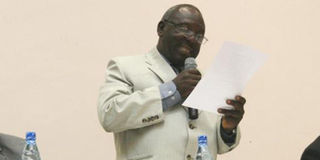New plan for elderly on cards

Dr Edwin Mng’ong’o from the ministry of Health, Community Development, Gender, Elderly and Children
What you need to know:
A ministry official says new regulations are meant to ensure that the elderly population, which has hit 2.6 million, live longer and in good health
Morogoro. The government is preparing regulations to compel children to cater for the needs of their ageing parents, it has been revealed.
It said the move was part of government’s efforts to ensure that the elderly live longer and healthier.
This was said by Dr Edwin Mng’ong’o from the ministry of Health, Community Development, Gender, Elderly and Children, during the opening of a meeting for Age-friendly Health Services on Wednesday.
“We are drafting regulations to compel children to take care of their ageing parents because some children neglect them,” he said.
“How come an older person, who had raised, say, nine children live in abject poverty?”
Dr Mng’ong’o also outlined other measures, which the government had taken to ensure that the elderly live healthily.
According to him, Tanzania has 2.6 million old people and 1.6 million of them have been provided with identification cards to access health care services for free.
He also revealed that more than 500,000 of them have been enrolled in the Community Health Fund. He further said 799 councils for the elderly had been formed across Tanzania.
Through such outfits, coordinated by district councils, the elderly meet at least once a month to discuss their challenges and propose solutions.
The coordinator for the elderly in the ministry for State in the President’s Office (Regional Administration and Local Authorities), Mr Shaban Mhali, warned district and municipal councils against failure to set up councils for the elderly.
One elderly person, who attended the meeting, Mzee Khamis Juma, spoke of challenges. “You might go to hospital and receive treatment, but when you go back home you have nothing to eat.”
Mzee Juma also said Tanzania had a shortage of skilled health personnel for the elderly.




